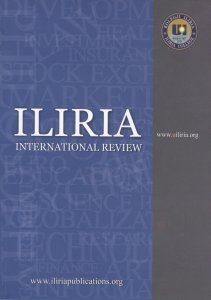The Greek Independence Revolution and Beyond: The Zooming of the Albanian Role and Impact
The Greek Independence Revolution and Beyond: The Zooming of the Albanian Role and Impact
Author(s): Arben J. SalihuSubject(s): Civil Society, Political history, Social history, Government/Political systems, 19th Century, Sociology of Politics
Published by: Kolegji ILIRIA and Felix-Verlag
Keywords: Greece; Albanians; war; military; population; politics; language;
Summary/Abstract: The nineteenth century is generally considered a century which inspired many nations, both in the East and West, towards the path of independence. While their aims may have been similar, the approach, the overall struggles and management of their individual independence courses, were rather distinctive. One of the most striking examples was Greece. The ethnic Greeks may have had a great desire to obtain independence, but lacked strategy, commitment, and unwavering determination. Their independence fate, however, was destined to be heavy relied, upon their ancient neighbors, the Albanians. Indeed, the Albanians turned out to be the principal benefactor on the ground, conducive to Greek independence. The main aim of this research is to expose the Albanian role especially during the Greek independence revolution. A substantial part of the study delves in the Albanian leadership and responsibility (both military and political) during the respective revolution. The study also explores that thousands of Albanian soldiers from various factions took part in Greek revolution battles. In addition, the study addresses the fact that the Albanian soldiers resorted to fights, even, with their fellow Albanians, all related to the Greek independence. The key objective of the paper is exclusive reliability on the Western sources (British, American, German, Italian or French), vis-à-vis examined topics, to increase, as much as possible, the objectivity of the research outcome. Several distinct themes are examined, considering Albanian contribution to the establishment of the modern Greece, almost all of them, originating from the Western sources of the nineteenth century, the century when the revolution occurred. The paper also incorporates the descriptions of the accounts, of three Westerners (Thomas Gordon, British army officer, Samuel Gridley Howe, American Medical Doctor and George Finlay, a Scottish historian), who were part of revolution and witnessed the developments. The research also delves on the implication of the ethnic Albanians in Greek politics, (both in the nineteenth and in several decades of the twentieth century), in which the Albanians „occupied‟ the key positions in Greek government, sometimes almost uninterrupted for decades, (like the post of the Prime Minister and the Ministry of Marine), during the nineteenth and the twentieth century. The study also explores the segment of the assimilation or the Hellenization of the Albanians in Greece, and offers a view on the challenges that developed, especially with respect to the exposition of Albanian identity within Greece. In addition, the paper also briefly examines the Albanian social impact in Greece, by offering interesting inputs and establishes that Albanian contribution to the modern Greece is rather unique, not only in the Balkan context, but very likely, sui generis, for the entire world. Finally, the study concludes that it is an exclusive responsibility of the historians, both, in the region and beyond, to present, as much as possible, an objective and compromising picture of history, and use it as a mechanism to create, not fresh hate, but synergic effect, conducive to encounter future challenges.
Journal: ILIRIA International Review
- Issue Year: 10/2020
- Issue No: 2
- Page Range: 251-287
- Page Count: 37
- Language: English

